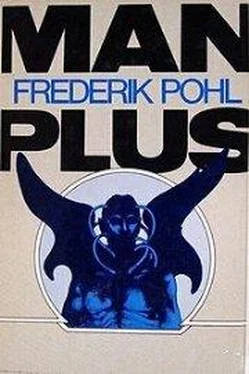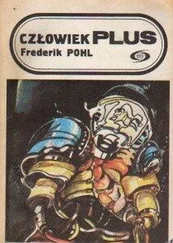What man? Brad, he thought. It wouldn’t be impossible; he had left Brad down at the tank twenty-five minutes ago by the clock. Time enough for them to rendezvous somewhere. Even time enough for Brad to get to the Torraway home. Perhaps she was not out at all. Perhaps—
Fourth ring—
Perhaps they were there, the two of them, naked and coupling on the floor in front of the phone. She would be saying, “Go in the other room, honey, I want to see who it is.” And he would say, laughing, “No, let’s answer this way.” And she would say—
Fifth ring — and the raster blossomed into the colors of Dorrie’s face. Her voice said, “Hello?”
Quick as sound Roger’s fist shot out and covered the lens. “Dorrie,” he said. His voice sounded flat and harsh again to him. “How are you?”
“Roger!” she cried. The pleasure in her voice sounded very real. “Oh, honey, I’m so glad to hear you! How are you feeling?”
His voice automatically said, “Fine.” It went on, without the need of help from his conscious mind, to correct the statement, to say what had been happening to him, cataloging the tests and the exercises. At the same time he was staring into the screen with every sense on high gain.
She looked — what? Tired? Looking tired was confirmation of his fears. She was carousing with Brad every night, heedless of her husband in pain and clownish humiliation. Rested and cheerful? Looking rested and cheerful was confirmation, too. It meant she was relaxing, enjoying herself — heedless of her husband’s torment.
There was really nothing wrong with Torraway’s brain, in that it had a lifelong habit of analysis and logic. It did not fail to occur to him that the game he was playing with himself was called “You Lose.” Everything was evidence of Dorrie’s guilt. Yet no matter how carefully he scanned her image, with what multiplied senses, she didn’t look hostile or cloyingly overaffectionate. She only looked like Dorrie.
When he thought that he felt a burst of tenderness that made his voice break. “I’ve missed you, honey,” he said flatly. The only thing that spoke of feelings was that one syllable was retarded a fraction of a second: “Hon… ee.”
“And I’ve missed you. I’ve kept myself busy, dear,” she chattered. “I’ve been painting your den. It’s a surprise, but of course it’s going to be such a long time till you see it that — Well, it’s going to be peach. With buttercup woodwork and I think maybe a pale-blue ceiling. You like? I was going to make it all ochre and brown, you know, fall colors, Mars colors, to celebrate. But 1 thought by the time you got back you’d be pretty sick of Mars colors!” And quickly, without pause: “When am I going to see you?” The change in her voice caught him by surprise.
“Well, I look pretty awful,” he said.
“I know what you look like. Dear God, Roger, do you think Midge and Brenda and Callie and I haven’t talked this over for the last two years? Ever since the program started. We’ve seen the sketches. We’ve seen the photos of the mockups. And we’ve seen the pictures of Willy.”
“I’m not exactly like Willy any more. They’ve changed things—”
“And I know about that too, Roger. Brad told me all about it. I’d like to see you.”
At that moment his wife’s face changed without warning to a witch’s. The crochet hook she held became a peasant twig broom. “You’ve been seeing Brad?”
Was there a microsecond pause before she answered? “I suppose he shouldn’t have told me,” she said, “because of security and all. But I wanted him to. It’s not that bad, honey. I’m a big girl. I can handle it.”
For a moment Roger wanted to snatch his hand away from the lens and let himself be seen, but he was becoming confused, feeling strange. He could not interpret his feelings. Was it vertigo? Emotion? Some malfunction in his machine half? He knew it would be only moments until Sulie or Don Kayman or someone came in, warned by the telltale telemetry outside. He tried to control himself.
“Maybe later,” he said without conviction. “I — I think I’d better hang up now, Dorrie.”
Behind her their familiar living room was changing too. The depth of field of the phone lens was not very good; even to his machine senses the rest of the room was blurred. Was that a man standing in the shadows? Was it wearing a Marine officer’s shirt? Would Brad be doing that?
“I have to hang up now,” he said, and did.
Clara Bly came in, full of questions and concern. He shook his head at her without speaking.
There were no lachrymeal ducts in his new eyes, so of course he could not cry. Even that relief was denied him.
Eleven
Dorothy Louise Mintz Torraway as Penelope
Our trendline projections had shown that the time was right to let the world know about Roger Torraway, warts and all. So it had all gone out, and every TV screen in the world had seen Roger on point in a dozen perfect fouettes, in between the close-ups of the starved dead in Pakistan and the fires in Chicago.
It had the effect of making Dorrie a celebrity. Roger’s call had upset her. Not as much as the note from Brad saying that he wouldn’t be able to see her again, not nearly as much as the forty-five minutes the President had spent with her impressing on her what would happen if she messed up his pet astronaut. Certainly not as much as the knowledge that she was being followed, her telephone tapped, her home certainly bugged. But she hadn’t known how to deal with Roger. She suspected she never would, and did not mind at all that in a few days he would be launched into space, where there would be little necessity for her to worry about their relationship for at least a year and a half.
She also did not mind the sudden glare of publicity.
Now that the newspapers had it all the TV reporters had been to see her, and she had seen her own courageous face on the six o’clock report. Fem was sending someone around. The someone phoned first. She was a woman of about sixty, veteran of the lib years, who sniffed, “We never do this, interviewing somebody just because she’s somebody’s wife. But they wanted it. I couldn’t turn down the assignment, but I want to be honest with you and let you know that it’s distasteful to me.”
“I’m sorry,” Dorrie apologized. “Do you want me to cancel out?”
“Oh, no,” said the woman, speaking as though it were Dorrie’s fault, “it’s not your fault, but I think it’s a betrayal of everything Fem stands for. Never mind. I want to come up to your home. We’ll do a fifteen-minute spread for the cassette edition, and I’ll write it up for the print. If you can—”
“I—” Dorrie began.
“—try to talk about you, rather than him. Your background. Your interests. Your—”
“I’m sorry, but I’d really prefer—”
“—feelings about the space program and so on. Dash says it’s an essential American objective and the future of the world depends on it. What do you think? I don’t mean answer the question now, I mean—”
“I don’t want to have it in my home,” Dorrie inserted into the conversation, without waiting for a place for it.
“—think about it, and answer on camera. Not at your home? No, that’s not possible. We’ll be over in an hour.”
Dorrie was left with a dwindling spot of light to talk to, and then even that was gone. “Bitch,” she said, almost absent-mindedly. She didn’t really mind having the interview in her home. She minded not being given a choice. That she minded a lot. But there was no choice available to her, except to go out before the Fem person showed up.
Dome Torraway, Dee Mintz as was, felt strongly about having choices. One of the things that had attracted her to Roger in the first place, apart from the glamour of the space program and the security and money that went with it — and apart from Roger’s rather nice-looking, studly self — was that he was willing to listen to what she wanted. Other men had been mostly interested in what they wanted, which was not the same from man to man but very consistent within the range of relationships of any one man. Harold always wanted to dance and party, Jim always wanted sex, Everett wanted sex and parties, Tommy wanted political dedication, Joe wanted mothering. What Roger wanted was to explore the world with her along, and he seemed perfectly willing to explore the parts of it that she wanted as much as the parts that were important to him.
Читать дальше












